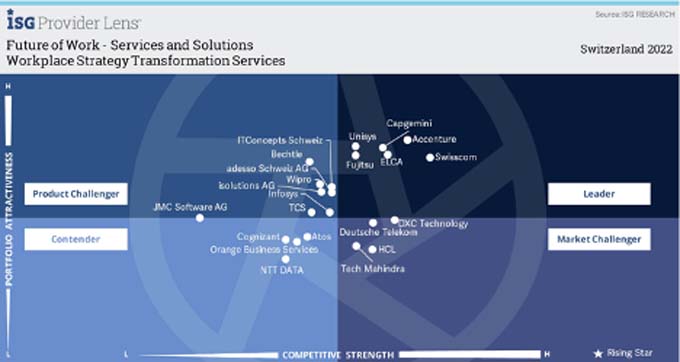Hybrid work: Swiss New Work providers focus on quality
According to a new ISG study, Swiss companies are beginning to fundamentally rethink the future of their working methods and environments. Swiss new-work providers score points with their high quality standards.

With the return to the office after the COVID pandemic, most Swiss companies are realizing that there is no easy way back to previous working models. They are therefore increasingly turning to hybrid working. These ways of working allow people to work both from the office and from home. In addition, the new comparative study "ISG Provider Lens Future of Work - Services & Solutions Switzerland" reports that the focus is no longer just on technological issues of workplace equipment, but on embedding "New Work" in the overall corporate strategy. The study was conducted by the market research and consulting company Information Services Group (ISG) published. The provider comparison examines the competitive strength and portfolio attractiveness of 27 service providers active in the Swiss market for future-of-work services and solutions.
Hybrid working: Swiss providers with competitive advantages
"The transition to working from home was primarily a technological challenge. Now it's about the overarching transformation of work and business processes," says Jochen Steudle, Senior Consultant, EMEA, at Information Services Group (ISG). Accordingly, the current need for consulting on hybrid working is very high. "There are no standard solutions here yet. So at present, it is primarily the service providers who are driving the necessary organizational change through innovations and thus also contributing to the necessary cultural change in mentality," Steudle continues.
Especially when it comes to cultural issues, Swiss providers have a competitive advantage thanks to their "Swissness. "They simply know the sensitivities of Swiss customers better," says ISG analyst Steudle. "In addition, local service providers cultivate a particularly high quality standard, which also leads to plus points in the Swiss market compared to international competitors."
The role of IT
According to the ISG study, the transition to hybrid working is also a must because younger skilled workers in particular would be hard to attract otherwise. According to the study, a demographic change is currently taking place in the world of work, as skilled workers born in the late 1990s and early 2000s are now entering the workforce. This "Generation Z" has, in some cases, completely new requirements for the workplace. Young professionals are already familiar with social media and digital collaboration before they even enter the workforce, he said. At the same time, the needs of older team members had to be taken into account. Therefore, companies can no longer rely on a standardized workplace according to the motto "one for all," but must offer flexible working models.
According to the ISG study, a central role in this transformation is played by corporate IT and supporting IT service providers. In the case of new-work solutions, they are expected not only to provide IT systems and the associated processes, but also to play a key role in redefining companies' business and operating models.

Market for pure technology solutions shrinks
Accordingly, ISG research has found that the market for solutions focused exclusively on technologies or end-user computing is shrinking. Instead, initiatives for hybrid workplaces are increasingly in demand as part of a larger digital and organizational transformation. This does not mean that traditional, technology-oriented services are no longer in demand. But, he says, they are now usually part of larger transformation projects that focus more on the concrete impact on employee satisfaction and retention. In the hybrid work scenario, for example, it is essential to actively address digital burnout and inadequate work-life balance, he says.
Among the market leaders in the Swiss segment for strategic services for workplace transformation, the ISG study found that two original Swiss providers were able to establish themselves. Compared to the large, globally active service providers, they score points with above-average quality standards. In addition, they know the market and the local companies better than average. In this way, they can keep up with the competition, although the international providers have price advantages, for example, because of their larger low-cost resources, according to the ISG study.
The greater cultural proximity also plays into the hands of Swiss providers, especially with those generally smaller companies whose customers are concentrated in Switzerland and nearby foreign countries. ISG therefore assumes that Swiss providers will continue to be among the leading service providers in the market in the future. The prerequisite for this, however, is that they invest sufficiently in new and innovative solutions, as the "future of work" market will remain very dynamic for the foreseeable future.









